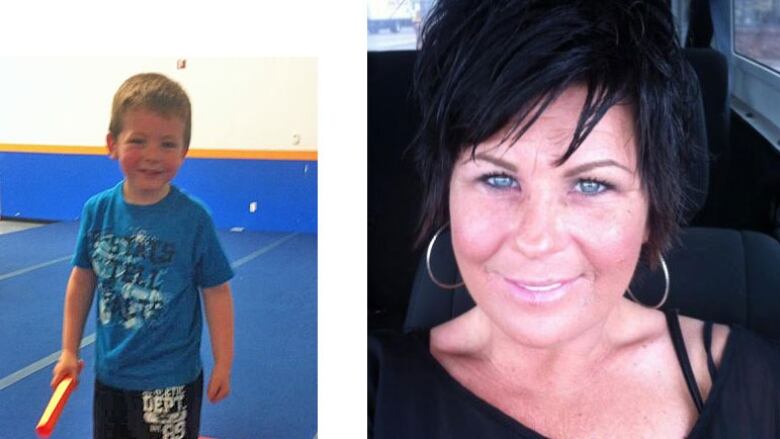Patricia Hennessey, Nash Campbell inquest: expert testifies
Expert says children in these 'war zone' situations shut down over time

An expert on family violence testifying at the inquest into the murder-suicide of 4-year-old Nash Campbell and his mother Patricia Hennessey Monday, says homicides in these cases are often "predictable and preventable."
Dr. Peter Jaffe, a professor at the University of Western University in Ontario, says family members and others often see the risks in these situations, but don't know what to do with them.
Jaffe says children in these "war zone" situations lose their voice.
They start to shut down over time, because they don't know who they can trust, he says.
On a mobile device? Click here to read Sally Pitt's live blog.
Campbell and Hennessey died in a vehicle fire near Tignish on June 21, 2013. Their deaths were ruled a murder-suicide.
Hennessey had lost custody of her son to his father the day before.
Mothers who kill their own children are often suffering from a psychiatric disorder and believe their child is better off dead with them, since they see the child as an extension of themselves, Jaffe told the inquest.
"Clearly Nash was in danger, in living with his mother," said Jaffe, adding that the danger might not have been of homicide, but of domestic violence.
Murder of a child by a parent is rare and it doesn't happen out of the blue, he says.
Common risk factors were present in this case: child custody and access disputes; allegations of violence; and a lack of coordination by the various agencies involved in the family's case, says Jaffe.
The inquest heard earlier that Nash's father, Marc Campbell, was charged with assaulting Hennessey, but charges were stayed.
'All-out war'
Jaffe says Nash's parents were in an "all-out war."
The conflict also extended to Nash's grandparents, who were drawn into the dispute between the boy's parents, Jaffe told the inquest.
"The depth of the family conflict is profound" said Jaffe. "These parents shouldn't have been within a mile of each other."
He also says professionals involved have pieces of a puzzle and have to share information.
With 133 incidents of risk and 43 risk factors to Nash in the file, Jaffe says there were "significant opportunities to intervene."
He told the inquest if the judge had this information the outcome might have been different.
"No mental health professional" would have given advice to the judge to allow Hennessey custody of Nash overnight the day she lost custody, he says.
Jaffe also told the inquest, that child protective services and police should have been in the courtroom at the custody hearing.
Child advocate
P.E.I. could lead the way in Canada by setting up an integrated court registry system, allowing all incidents involving a family to be recorded in one place, says Jaffe.
He also recommends easier access to family law support and an independent assessment of a child's situation to determine custody.
In answer to the Crown's question about the value of having a child advocate for P.E.I., Jaffe said it would ensure "children have a voice" in these cases.

The inquest has already heard from numerous witnesses who have outlined involvement by various agencies, including Child and Family Services, Probation Services, police and a psychiatrist.
The coroner and jury have also heard from Marc Campbell, his mother, and from several members of Hennessey's family.
This is expected to be the last day for witness testimony, then the jury of six will deliberate on recommendations to the coroner on how to prevent future tragedies.